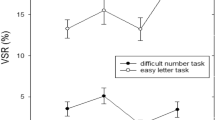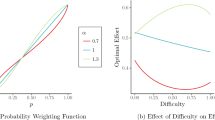Abstract
Earlier study has shown that procrastination can be explained by quasi-hyperbolic discounting. We present a model of effort choice over time that shifts the focus from completion of to performance on a single task. We find that being aware of the own self-control problems may reduce a person’s performance as well as his or her overall well-being, which is in contrast to the existing literature on procrastination. Extending this framework to a multi-task model, we show that interim deadlines help a quasi-hyperbolic discounter to structure his or her workload more efficiently, which in turn leads to better performance. Moreover, being restricted by deadlines increases a quasi-hyperbolic discounter’s well-being. Thus, we provide a theoretical underpinning for recent empirical evidence and numerous casual observations.
Similar content being viewed by others
References
Akerlof G. A. (1991) Procrastination and obedience. American Economic Review 81: 1–19
Akin Z. (2007) Time inconsistency and learning in bargaining games. International Journal of Game Theory 36: 275–299
Amador M., Werning I., Angeletos G.-M. (2006) Commitment vs. flexibility. Econometrica 74: 365–396
Angeletos G.-M., Laibson D., Repetto A., Tobacman J., Weinberg S. (2001) The hyperbolic consumption model: Calibration, simulation, and empirical evaluation. Journal of Economic Perspectives 15: 47–68
Ariely D., Wertenbroch K. (2002) Procrastination, deadlines, and performance: Self-control by precommitment. Psychological Science 13: 219–224
Bénabou R., Tirole J. (2002) Self-confidence and personal motivation. Quarterly Journal of Economics 117: 871–915
Carrillo J. D., Mariotti T. (2000) Strategic ignorance as self-disciplining device. Review of Economic Studies 67: 529–544
DellaVigna S., Malmendier U. (2004) Contract design and self-control: Theory and evidence. Quarterly Journal of Economics 119: 353–402
DellaVigna S, Malmendier U. (2006) Paying not to go to the gym. American Economic Review 96: 694–719
DellaVigna S., Paserman M. D. (2005) Job search and impatience. Journal of Labor Economics 23: 527–588
Diamond P., Kőszegi B. (2003) Quasi-hyperbolic discounting and retirement. Journal of Public Economics 87: 1839–1872
Fischer, C. (1999) Read this paper even later: Procrastination with time-inconsistent preferences. Resources for the Future discussion paper 99-20.
Fischer C. (2001) Read this paper later: Procrastination with time-consistent preferences. Journal of Economic Behavior and Organization 46: 249–269
Frederick S., Loewenstein G., O’Donoghue T. (2002) Time discounting and time preference. Journal of Economic Literature 40: 351–401
Gruber J., Kőszegi B. (2001) Is addiction rational? Theory and evidence. Quarterly Journal of Economics 116: 1261–1303
Laibson D. (1996) Hyperbolic discount functions, undersaving, and savings policy. NBER Working Paper Series, No.5635, Cambridge, MA.
Laibson D. (1997) Golden eggs and hyperbolic discounting. Quarterly Journal of Economics 112: 443–477
Laibson D. (1998) Life-cycle consumption and hyperbolic discount functions. European Economic Review 42: 861–871
Laibson D., Repetto A., Tobacman J. (1998) Self-control and saving for retirement. Brookings Papers on Economic Activity 1: 91–196
Nocke V., Peitz M. (2003) Hyperbolic discounting and secondary markets. Games and Economic Behavior 44: 77–97
O’Donoghue T., Rabin M. (1999a) Addiction and self-control. In: Elster J. (eds) Addiction: Entry and Exits. Russel Sage Foundation, New York
O’Donoghue T., Rabin M. (1999b) Doing it now or later. American Economic Review 89: 103–124
O’Donoghue T., Rabin M. (1999c) Incentives for procrastinators. Quarterly Journal of Economics 114: 769–816
O’Donoghue T., Rabin M. (2001a) Addiction and Present-Biased Preferences. working paper. University of California, Berkeley
O’Donoghue T., Rabin M. (2001b) Choice and procrastination. Quarterly Journal of Economics 116: 121–160
O’Donoghue T., Rabin M. (2005) Incentives and Self-Control. working paper, University of California, Berkeley.
O’Donoghue T., Rabin M. (2008) Procrastination on long-term projects. Journal of Economic Behavior and Organization 66: 161–175
Phelps E. S., Pollak R. A. (1968) On second-best national saving and game-equilibrium growth. Review of Economic Studies 35: 185–199
Pollak R. A. (1968) Consistent planning. Review of Economic Studies 35: 201–208
Sarafidis, Y. (2005). Inter-temporal price discrimination with time inconsistent consumers. Working paper, Yale University.
Skiba P. M., Tobacman J. (2008). Payday Loans, Uncertainty, and Discounting: Explaining Patterns of Borrowing, Repayment, and Default. working paper, University of Pennsylvania.
Strotz R. H. (1956) Myopia and inconsistency in dynamic utility maximization. Review of Economic Studies 23: 156–180
Tobacman J. (2007) The partial Naivete Euler equation. working paper, University of Pennsylvania.
Wong W.-K. (2008) How much time-inconsistency is there and does it matter? Evidence on self-awareness, size, and effects. Journal of Economic Behavior and Organization 68: 645–656
Author information
Authors and Affiliations
Corresponding author
Rights and permissions
About this article
Cite this article
Herweg, F., Müller, D. Performance of procrastinators: on the value of deadlines. Theory Decis 70, 329–366 (2011). https://doi.org/10.1007/s11238-010-9195-6
Published:
Issue Date:
DOI: https://doi.org/10.1007/s11238-010-9195-6
Keywords
- Effort choice
- Deadlines
- (Quasi-) Hyperbolic discounting
- Naiveté
- Present-biased preferences
- Sophistication




